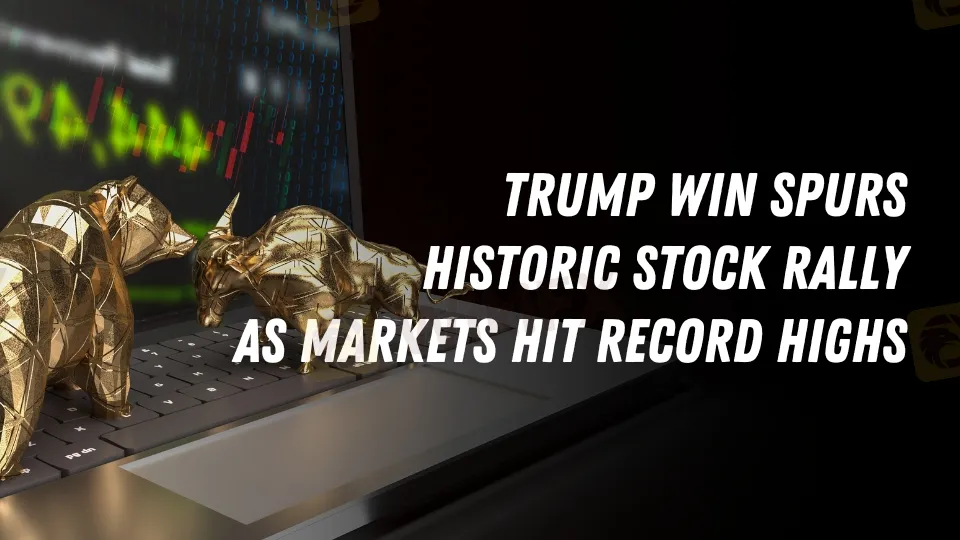简体中文
繁體中文
English
Pусский
日本語
ภาษาไทย
Tiếng Việt
Bahasa Indonesia
Español
हिन्दी
Filippiiniläinen
Français
Deutsch
Português
Türkçe
한국어
العربية
Trump Win Spurs Historic Stock Rally as Markets Hit Record Highs
Abstract:U.S. stocks surge to record highs after Trump’s return, with gains in financials, tech, and small-cap stocks amid expectations of tax cuts and deregulation.

In a remarkable change for Wall Street, U.S. equities surged to new highs when Donald Trump won a second term in the 2024 presidential election. Investors rallied quickly, bolstered by prospects for lower taxes, less regulation, and a more forceful economic policy under Trump's leadership. The Dow Jones Industrial Average, S&P 500, and Nasdaq all finished at record highs, resulting in one of the largest single-day gains in recent years.
Financial stocks led the charge, with the S&P 500's financial sector rising 6.16%, the best performance among the main sectors. The bank index rose over 11%, the most in two years, as investors expected fewer rules that would benefit the banking industry. Treasury rates also increased dramatically, with the 10-year yield hitting 4.48%, the highest level in four months, as speculators anticipated an inflationary growth trajectory.

The election also sparked “Trump trades,” which boosted bitcoin and energy stocks while putting pressure on sectors like renewable energy. Bitcoin hit an all-time high of more than $76,000, while the US dollar had its biggest single-day rise since 2022, indicating investor optimism in Trump's economic prospects.
Despite earlier surveys anticipating a tight race, the election results provided immediate clarity, prompting traders to rapidly change their holdings. “This was a risk-on day,” said Mark Luschini, the chief investment strategist at Janney Montgomery Scott. “Anything tied to growth surged, as the market pivoted quickly from cautious to enthusiastic.”
Small-cap stocks rose sharply, with the Russell 2000 index rising 5.84%—its highest gain in almost a year—as domestically oriented businesses were anticipated to profit from deregulation and possibly looser trade barriers. However, Luschini warned that if rates continue to rise near the 5% area, small caps and even wider market sentiment might suffer.
Tesla surged over 15% after Trump's victory, boosted by CEO Elon Musk's apparent support for his campaign. Other equities expected to gain from Trump's plans, such as Trump Media & Technology Group, also rose, finishing up 5.94%.
The rise expanded to sectors that were previously thought to benefit from Trump's attitude, such as cryptocurrency businesses, oil corporations, and private prison operators, while renewable energy stocks fell. The CBOE Volatility Index, sometimes known as Wall Street's “Fear Gauge,” fell sharply to 16.27, the lowest level in six weeks, indicating a decrease in market uncertainty after the election.
Market experts also kept a tight watch on prospective changes in Congress, where a Republican-led Senate is likely to limit resistance to Trump's plans. If Republicans keep their majority in the House, investors expect simpler policy execution, which would likely continue to stimulate pro-growth industries.
As trade volumes reached a record of 18.68 billion shares, well above the previous average of 12.16 billion, market momentum showed no signs of slowing. Both the S&P 500 and the Nasdaq have set fresh 52-week highs, reflecting strong investor interest across sectors.
Final thoughts,
The comeback of Trump's economic plans has created a buoyant atmosphere on Wall Street, with investors eagerly anticipating deregulation and tax cuts. However, as Treasury rates reach hazardous levels, concerns about the rally's long-term viability persist. This post-election panorama represents a fresh convergence of fiscal policy with investor confidence, with considerable opportunities—and possible challenges—depending on the prevailing economic conditions.
Stay updated with the latest financial news and insights! Dive deeper into the market trends behind Trump's economic impact on Wall Street on WikiFX News.

Disclaimer:
The views in this article only represent the author's personal views, and do not constitute investment advice on this platform. This platform does not guarantee the accuracy, completeness and timeliness of the information in the article, and will not be liable for any loss caused by the use of or reliance on the information in the article.
Read more

The Daily Habits of a Profitable Trader
Every professional trader follows a structured approach to ensure they are well-prepared, disciplined, and able to seize opportunities with confidence. Whether you are a seasoned investor or an aspiring trader, adhering to a robust daily checklist can significantly enhance your performance. Use this checklist to check if you are a qualified trader

Authorities Alert: MAS Impersonation Scam Hits Singapore
MAS scam alert: Scammers impersonate officials, causing $614K losses in Singapore since March 2025. Learn how to spot and avoid this impersonation scam.

Billboard Warns of Crypto Scams Using Its Name – Stay Alert!
Billboard warns against fake crypto scams using its brand. Learn how to spot fraud and protect yourself from fake promotions.

The Impact of Interest Rate Decisions on the Forex Market
Interest rate changes determine currency attractiveness, influencing capital flows and exchange rate trends. Understanding this mechanism helps investors navigate the forex market effectively.
WikiFX Broker
Latest News
TradingView Brings Live Market Charts to Telegram Users with New Mini App
Trump tariffs: How will India navigate a world on the brink of a trade war?
Interactive Brokers Launches Forecast Contracts in Canada for Market Predictions
Authorities Alert: MAS Impersonation Scam Hits Singapore
Stocks fall again as Trump tariff jitters continue
INFINOX Partners with Acelerador Racing for Porsche Cup Brazil 2025
Regulatory Failures Lead to $150,000 Fine for Thurston Springer
April Forex Trends: EUR/USD, GBP/USD, USD/JPY, AUD/USD, USD/CAD Insights
March Oil Production Declines: How Is the Market Reacting?
Georgia Man Charged in Danbury Kidnapping and Crypto Extortion Plot
Currency Calculator







